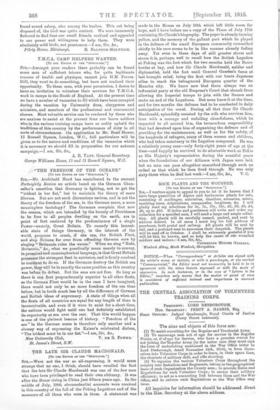THE LATE SIR CLAUDE MACDONALD.
[To Tall EDITOR or TIER "SFECTATOR."] Sra,—Were not the war so all-engrossing, it would seem strange that no one, I think, should have recalled the fact that the late Sir Claude Macdonald was one of the few men who have been privileged to read their own obituary. It was after the Boxer rising in China just fifteen years ago. In the middle of July, 1900, circumstantial accounts were received in this country of the fall of the Peking Legations and of the massacre of all those who were in them. A statement was made in the House on July 16th which left little room for hope, and I have before me a copy of the Times of July 17th containing Sir Claude's biography. The paper is already turning yellow, and the memory of the gallant part which be played in the defence of the small European community committed chiefly to his care seems to be in like manner already fading away. Yet even in these days of still greater storm and stress it is, perhaps, well to recall how the British Legation at Peking was the fort which for two months held the Boxer hordes at bay, and how Sir Claude Macdonald. soldier and diplomatist, held the fort until General Gaselee'a force at last brought relief, being the first with our brave Japanese allies to reach the beleaguered European quarter of the Manchu city. We know now that there always was an influential party at the old Empress's Court that shrank from allowing the Imperial troops to join with the Boxers and make an end of the Legations. But none knew it at the time, and for two months the defence had to be conducted in daily anticipation of the worst. During all that time Sir Claude Macdonald, splendidly assisted by the wife who survives him, bore with a courage and unfailing cheerfulness, which he imparted to all around him, the tremendous responsibility that had devolved upon him of organizing the defence and of providing for the maintenance, as well as for the safety, of the hundreds of refugees, many of them women and children, who had taken sanctuary in the Legation compound. He was a relatively young man—only forty-eight years of age at the time—and happily he survived to do admirable work at To4io as Hie Majesty's representative during the eventful years when the foundations of our Alliance with Japan were laid, but no man can pass altogether unscathed through such an ordeal as that which he then lived through. He was only sixty-three when •he died last week.—I am, Sir, &c., T. C.


































 Previous page
Previous page